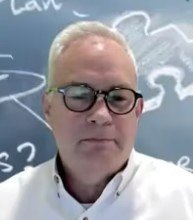BTR: As MSPs Mature, Consolidation and Operational Discipline Drive the Next Wave of Growth

Paul Daigle, Biz Advisory Board
SILVER SPRING, MD, UNITED STATES, June 24, 2025 /EINPresswire.com/ -- As small and mid-sized businesses continue to outsource their IT operations, the managed service provider (MSP) market is undergoing a quiet transformation — from a fragmented cottage industry to a maturing, data-driven, and increasingly consolidated sector.
Fueled by rising cybersecurity demands, vertical compliance requirements, and rapid advances in automation and AI, MSPs are evolving from reactive tech support shops into full-scale IT partners. But not all MSPs are keeping up with the pace of change.
According to industry veteran Paul Daigle, CEO of Biz Advisory Board, the widening gap between high-performing MSPs and the long tail of under-resourced providers is reshaping the competitive landscape. “You’ve got a clear divide emerging between MSPs with scalable infrastructure and those still operating like local service shops,” Daigle said in a recent BizTechReports vidcast.
A Market on the Rise
The broader market context is bullish. The global managed services market, valued at $297.2 billion in 2024, is expected to grow to $330.4 billion in 2025, ultimately reaching $878.7 billion by 2032, according to Fortune Business Insights. This growth represents a compound annual growth rate (CAGR) of 15.0%, driven largely by the need for outsourced IT management among SMBs, cloud adoption, and heightened security needs.
In North America, which accounts for 43.8% of the global market share, MSPs are increasingly positioned as strategic enablers of digital transformation rather than just break-fix providers.
The competitive environment is intensifying as more businesses adopt hybrid cloud environments, remote work models, and AI-powered security tools — all of which require specialized expertise that many internal IT teams lack. As a result, MSPs are evolving into essential business enablers, with differentiation now hinging on industry specialization, automation capabilities, and the ability to deliver measurable outcomes.
Consolidation Accelerates as Complexity Grows
As MSP clients demand more sophisticated services — including layered cybersecurity, cloud orchestration, and compliance support — smaller providers face mounting operational and financial pressure. This is driving a wave of consolidation across the industry.
“Mature MSPs in the $6 million to $12 million revenue range are acquiring smaller competitors to expand capabilities and vertical expertise,” Daigle noted. “It’s no longer viable to be a generalist. The winners are standardizing on specific industries like healthcare, finance, and legal, and scaling their delivery models accordingly.”
Focusing on specific industries early allows MSPs to build deep institutional knowledge, develop reusable solution frameworks, and establish long-term relationships with clients who share similar operational needs. This foundation enables more efficient service delivery, stronger client retention, and creates a natural runway for both organic growth and strategic acquisitions.
The sector saw 71 M&A transactions in Q4 2024 alone, and 2025 is expected to bring a 50% increase in MSP deal volume, according to analysts at Greenwich Group and Austindale Capital. Private equity interest remains high, due in part to the sector’s high-margin, recurring revenue structure — with top-performing MSPs generating EBITDA margins of 30–40%.
Daigle pointed out that operational discipline, not just technical capability, is the main differentiator: “Once MSPs build out executive teams, invest in core business functions, and benchmark themselves against their peers, they scale faster and attract higher valuations.”
AI Moves from Hype to Operational Advantage
While artificial intelligence has generated buzz across the tech sector, MSPs are starting to apply AI in targeted, results-driven ways — particularly in customer service, cybersecurity, and IT operations.
“About 80% of the AI tools we’re seeing are deployed on the client side — to automate remediation, predict outages, and streamline security responses,” said Daigle
This aligns with recent data from Canalys, which reports that 53% of MSP partners are already realizing significant opportunities with AI. Efficient use of AI — especially for filtering alert noise, automating patching, and self-healing systems — is quickly becoming a competitive necessity rather than a novelty
“AI is helping MSPs shift from reactive to predictive service models,” Daigle added. “That translates directly into margin expansion and improved client satisfaction.”
By leveraging AI to anticipate and resolve common issues before they affect the end user, MSPs can reduce ticket volume, shorten resolution times, and provide a more seamless client experience. Intelligent chatbots, automated onboarding workflows, and proactive system alerts are making it easier for MSPs to deliver faster, more personalized support — while freeing human technicians to focus on high-value tasks.
The Path Forward: Scale with Strategy
While demand for managed services remains strong, the sector is clearly bifurcating. Larger, more disciplined firms are pulling away from the pack through specialization, acquisition, and investment in scalable infrastructure.
Meanwhile, many smaller MSPs — often led by technically adept founders without formal business structures — are struggling to keep pace.
Smaller MSPs in the $1 million to $4 million revenue range often lack dedicated marketing, sales, or HR functions. Without repeatable processes or formal leadership structures, they rely heavily on the founder's technical expertise to drive growth. This limits their ability to scale, attract capital, or compete for larger clients that demand standardized service delivery and robust compliance.
“The MSPs that grow past $6 million and $12 million have built repeatable, industry-specific playbooks and invested in leadership,” Daigle said. “Those that don’t are becoming acquisition targets or stagnating.”
With market conditions less-than favorable and capital now more expensive and challenging to secure, the level of discipline exercised by MSP leaders over the next few years will define the long-term winners of the sector.
Click here to read the Q&A Feature based on this interview.
Airrion Andrews
BizTechReports
email us here
Legal Disclaimer:
EIN Presswire provides this news content "as is" without warranty of any kind. We do not accept any responsibility or liability for the accuracy, content, images, videos, licenses, completeness, legality, or reliability of the information contained in this article. If you have any complaints or copyright issues related to this article, kindly contact the author above.
Black Circle Society Introduces Travel-Focused Lifestyle Membership Aimed at Frequent Flyers and Business Professionals
Future of Renewable Energy Integration Systems Market Growth, Leaders & Trends 2024–2031
Sinai Memorial Chapels Serves Delray Beach with Trusted, Tradition-Based Jewish Funeral Services
Więcej ważnych informacji
 Jedynka Newserii
Jedynka Newserii

 Jedynka Newserii
Jedynka Newserii

Polityka

D. Joński: Nie wiemy, co zrobi Rosja za dwa–trzy lata. Według duńskiego wywiadu może zaatakować kraje nadbałtyckie i musimy być na to gotowi
Zdecydowana większość krajów unijnych wskazuje na potrzebę wzmocnienia zdolności obronnych Europy w obliczu coraz bardziej złożonego geopolitycznego tła. Wywiady zachodnich państw wskazują, że Rosja może rozpocząć konfrontację z NATO jeszcze przed 2030 rokiem. Biała księga w sprawie obronności europejskiej „Gotowość 2030” zakłada m.in. ochronę granic lądowych, powietrznych i morskich UE, a sztandarowym projektem ma być Tarcza Wschód. – W budzeniu Europy duże zasługi ma polska prezydencja – ocenia europoseł Dariusz Joński.
Transport
Duże magazyny energii przyspieszą rozwój transportu niskoemisyjnego w Europie. Przyszłością może być wodór służący jako paliwo i nośnik energii

Zmiany w europejskim transporcie przyspieszają. Trendem jest elektromobilność, zwłaszcza w ramach logistyki „ostatniej mili”. Jednocześnie jednak udział samochodów w pełni elektrycznych w polskich firmach spadł z 18 do 12 proc., co wpisuje się w szerszy europejski trend spowolnienia elektromobilności. Główne bariery to ograniczona liczba publicznych stacji ładowania, wysoka cena pojazdów i brak dostępu do odpowiedniej infrastruktury. – Potrzebne są odpowiednio duże magazyny taniej energii. Przyszłością przede wszystkim jest wodór – ocenia Andrzej Gemra z Renault Group.
Infrastruktura
W Polsce w obiektach zabytkowych wciąż brakuje nowoczesnych rozwiązań przeciwpożarowych. Potrzebna jest większa elastyczność w stosowaniu przepisów

Pogodzenie interesów konserwatorów, projektantów, inwestorów, rzeczoznawców i służby ochrony pożarowej stanowi jedno z największych wyzwań w zakresie ochrony przeciwpożarowej obiektów konserwatorskich. Pożary zabytków takich jak m.in. katedra Notre-Dame w Paryżu przyczyniają się do wprowadzania nowatorskich rozwiązań technicznych w zakresie ochrony przeciwpożarowej. W Polsce obowiązuje już konieczność instalacji systemów detekcji. Inwestorzy często jednak rezygnują z realizacji projektów dotyczących obiektów zabytkowych z uwagi na zmieniające się i coraz bardziej restrykcyjne przepisy czy też względy ekonomiczne.
Partner serwisu
Szkolenia

Akademia Newserii
Akademia Newserii to projekt, w ramach którego najlepsi polscy dziennikarze biznesowi, giełdowi oraz lifestylowi, a także szkoleniowcy z wieloletnim doświadczeniem dzielą się swoją wiedzą nt. pracy z mediami.



![Nestlé w Polsce podsumowuje wpływ na krajową gospodarkę. Firma wygenerowała 0,6 proc. polskiego PKB [DEPESZA]](https://www.newseria.pl/files/1097841585/fabryka-nesquik_1,w_85,r_png,_small.png)




.gif)

 |
| |
| |
|